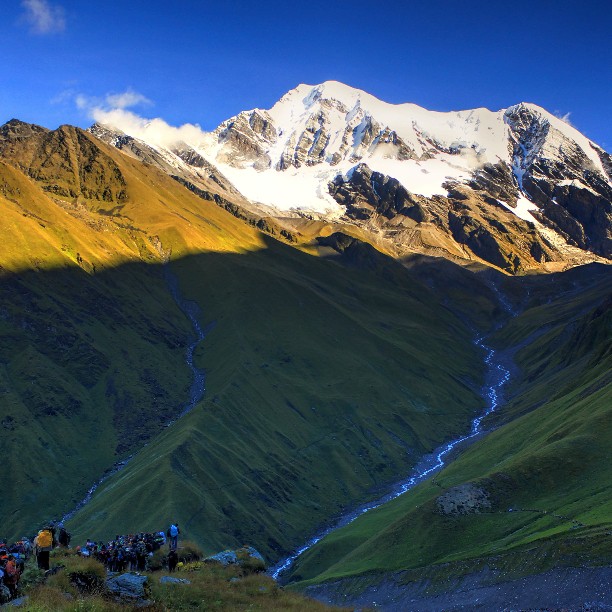
The popularity of Guided Trekking in India has seen an upward trend. While many trek organizers have learned the importance of keeping the trail clean, it has not translated into a success.
Some trek organizers believe taking a huge number of trekkers is justifiable. If you can bring your trash down then stars are the limit. This is a problem. And in the context of Roopkund, the number of trekkers is on the rise.
Roopkund today needs a breather. Ethical Trek Companies should opt in scaling down the number of batches they run. The Camping grounds of these treks are not going to expand. The infrastructure at the campsite is non-existent. You don’t have proper toilet facilities on a trek where fixed camps are set. How much amount of human excreta can the mountain consume? How much non-bio degradable waste lays on the trail untreated? Who can do the math and compute the ecological damage in the last 6 years alone in Roopkund?
I have seen the reluctance of few Organizers in addressing this concern. How is the need to expand business takes precedence over the ecological impact? Why do they get so defensive when someone talks about regulating the number of trekkers?
The low cost, bulk trekking business model is damaging. It does little in boosting the local micro-enterprise. It is difficult for local operators to now compete with Outside companies. A cost-cutting war hurts the quality and undermines the safety provided to trekkers. Chadar Trek is a good example of this.
Why can’t the Guided trekking be repositioned as a premium product? Why the compromises made by Organizers (in taking unfit and unprepared people) be overlooked?
Most of the Trek Operators have no clue how to work on it. They play the waiting game of seeing the Big Operators make the first move and try to follow them blindly. Unfortunately, what they are learning to focus is how to market/sell treks on social media, launching new treks etc.
The Guided Trekking in India needs regulations. If the government cannot step up, I hope The National Green Tribunal do.
The excerpt is taken from a reply, Vaibhav Chauhan wrote to an article that appeared on Down to Earth Magazine. | Lead Picture Credit : Praveen Upmanyu Purohit

this is the question of the hour…I have experienced it sometime back during Roopkund trek. Camping at Bagubhasa and being waken up at 3AM by Indiahikes trek leaders noise & whstle -even when we were not trekking with them. we were sharing the small camp site with Indiahikes. Unfortunately, these guys pitch the camp for entire trek season leaving little place for independent trekkers and small outfits. I was also taken a back with their style. The trekkers were mostly young bunch and were treated like a school kids -lots of pushing for getting up early and getting ready, having breakfast at 3.30 AM. I thought trekkers are a different bunch..self motivated! but Indiahikes is all set to change that…unfortunately, it’s forcing independent trekkers to modify their path & trails!
LikeLiked by 1 person
You make valid points and thanks for sharing these insights. As a Trek Organizer, we forget about how Guided Trekking appears to Independent Trekkers. That our presence may be ruining the experience of other groups around. I have been thinking aloud all these things, especially after going my separate ways. In all fairness, I do not consider Guided Trekking model (Huge batches, fixed camps) actually promoting REAL TREKKING! No wonder the locals and people from TREKKING Fraternity troll companies like these as “Baarati Trekking group”
P.S – It will be great if you can post your comments on our Facebook Page post as well so that more people get to see it.
LikeLiked by 1 person
That is some true insight which trekkers are not aware of. It is time, trekkers should start exploring virgin valleys rather than following trending treks. The true spirit of exploring is getting forgotten and there is chaos is upon the mountains. The worst impact is on Kedarkantha & Roopkund. This article was very necessary.
LikeLiked by 1 person
Cant agree more with the points being discussed here having experienced the same in some of the routes. The number of schedules published in a single season for a single trail for a single operator looks scary…If all those schedules are filled for all the operators with green horn trekkers, cant imagine the damage it will do the nature.
Needs bribe free regulations on how many max tours an organizer can arrange to a particular trail.
While visiting Chandra Taal on the way back to Pin Parvati, came across a bunch of trekkers from India Hikes made the lake appear like picnic spot !
LikeLiked by 1 person
That is why I think NGT is the best bet. There no nonsense approach is the need of the hour.
LikeLiked by 1 person
I do all my treks solo or independent hiring guides from village when needed. I though do recognise that not everyone has same familiarity with mountains (I myself come from Himachal) and hence need some organised way of doing this through trekking companies. But some of these companies(especially one mentioned below) are reckless and dont care a hoot about mountains and that is disturbing . I dont think there is any easy solution to this.
LikeLiked by 2 people